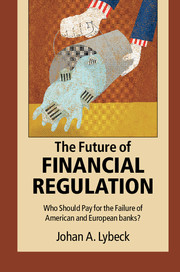Book contents
- Frontmatter
- Dedication
- Contents
- List of figures
- List of tables
- List of boxes
- Preface
- Acknowledgements
- List of abbreviations
- Introduction
- Part I A chronological presentation of crisis events January 2007 – December 2014
- Part II Bail-out and/or bail-in of banks in Europe: a country-by-country event study on those European countries which did not receive outside support
- 1 United Kingdom: Northern Rock, Royal Bank of Scotland (RBS), Lloyds Banking Group
- 2 Germany: IKB, Hypo Real Estate, Commerzbank, Landesbanken
- 3 Belgium, France, Luxembourg: Dexia
- 4 Benelux: Fortis, ING, SNS Reaal
- 5 Italy: Monte dei Paschi di Siena
- 6 Denmark: Roskilde Bank, Fionia Bank and the others vs. Amagerbanken and Fjordbank Mors
- Part III Bail-out and/or bail-in of banks in Europe: a country-by-country event study on those European countries which received IMF/EU support
- Part IV The TARP program and the bailing out (and bailing in) of US banks
- Part V Summary of the micro studies
- Part VI Political and regulatory responses to the crisis: to bail out or to bail in, that's the question
- Conclusion: toward host-country supervision and resolution?
- Addendum
- Bibliography
- Index
6 - Denmark: Roskilde Bank, Fionia Bank and the others vs. Amagerbanken and Fjordbank Mors
from Part II - Bail-out and/or bail-in of banks in Europe: a country-by-country event study on those European countries which did not receive outside support
Published online by Cambridge University Press: 05 February 2016
- Frontmatter
- Dedication
- Contents
- List of figures
- List of tables
- List of boxes
- Preface
- Acknowledgements
- List of abbreviations
- Introduction
- Part I A chronological presentation of crisis events January 2007 – December 2014
- Part II Bail-out and/or bail-in of banks in Europe: a country-by-country event study on those European countries which did not receive outside support
- 1 United Kingdom: Northern Rock, Royal Bank of Scotland (RBS), Lloyds Banking Group
- 2 Germany: IKB, Hypo Real Estate, Commerzbank, Landesbanken
- 3 Belgium, France, Luxembourg: Dexia
- 4 Benelux: Fortis, ING, SNS Reaal
- 5 Italy: Monte dei Paschi di Siena
- 6 Denmark: Roskilde Bank, Fionia Bank and the others vs. Amagerbanken and Fjordbank Mors
- Part III Bail-out and/or bail-in of banks in Europe: a country-by-country event study on those European countries which received IMF/EU support
- Part IV The TARP program and the bailing out (and bailing in) of US banks
- Part V Summary of the micro studies
- Part VI Political and regulatory responses to the crisis: to bail out or to bail in, that's the question
- Conclusion: toward host-country supervision and resolution?
- Addendum
- Bibliography
- Index
Summary
The Danish story
There are a number of reasons why the Danish banking sector and its way of handling failed banks is of interest. Firstly, the sector has undergone a dramatic consolidation in recent years with the number of banks falling to under one hundred under the influence of increased competition and the consequences of the financial crisis. Secondly, authorities have seized a number of banks and placed them under the holding company Finansiel Stabilitet. The FSA (Finanstilsynet) as well as the central bank have also been active in merging or liquidating failing banks.
Thirdly, and the reason for the country being included in this study, Denmark constitutes the first case in the European Union where even senior bondholders were forced to take “haircuts” when a bank was nationalized or merged. This possibility opened up in October 2010 when the unlimited guarantee for the domestic liabilities of Danish banks was allowed to lapse. Actually, already from 2007, a society was set up by the Danish Bankers’ Association (Det Private Beredskab til Afvikling af Nødlidende Banker, Sparekasser og Andelskasser, translated as the Private Society for the Winding-down of Failing Banks, Savings Banks and Cooperative Banks), whereby the banking sector itself was supposed through fees to finance the resolution of its ailing member banks, helping them to merge with stronger partners. While membership in the society is in principle voluntary, all but a few small banks have signed up. The contribution of the state and the taxpayers is thereby, as we shall see, limited in relation to the other countries which we have studied so far in this book.
Fourthly, Denmark has the world's largest mortgage market by capita or in relation to GDP and the second largest in Europe, after Germany, even in absolute numbers. Indeed, the mortgage bond market is four times the size of the domestic government bond market. This feature has, according to Denmark, to be taken into account when establishing Basel rules for the inclusion of liquid assets in the Liquidity Coverage Ratio (LCR) as well as limiting single counterparty exposures to 25 percent of Tier 1 capital. This is simply not feasible in a system dominated by four interconnected mortgage lenders (Nykredit, Realkredit Danmark, owned by Danske Bank, Nordea Kredit and BRF Kredit). The size of the mortgage market is obviously also of a great consequence for the development of “bubbles” and crashes.
- Type
- Chapter
- Information
- The Future of Financial RegulationWho Should Pay for the Failure of American and European Banks?, pp. 216 - 224Publisher: Cambridge University PressPrint publication year: 2016
- 1
- Cited by



